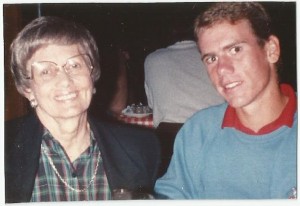
Mom (a.k.a. Mama Max) died July 4th, 1990. That’s my last picture with her: my 16th birthday meal at Gridley’s BBQ in Memphis. She wore her wig with all dignity and elegance. Her smile, as infectious as her cancer, betrayed her pain. She died nine months later.
You never forget the day. I pulled an all-nighter a local golf course watering greens (bentgrass greens’ only hope for survival in Memphis summers). Dad was already at the hospital when I arrived home around dawn. I was fast asleep when Uncle Jimmy woke me up. My brother Darrell was on the phone.
“Hello.”
“Well, it’s over.”
I don’t remember what we said next, if anything. I raced angrily to Methodist Central (now, Methodist University) in Memphis. I entered Mom’s room. She lay lifeless while Dad sat sentinel next to her like he promised in 1952. For better or worse, ’til death do we part.
A Mississippi Delta cotton field welcomed her into this world on a sweltering August day. The Delta received her back again on a sweltering July day. Born among the cotton and buried under the magnolia, God granted his most precious servant fifty-eight years. Sixteen of them with a cocksure son who still crumples under the weight of it all.
I was a hellbound church rat at the time who squinted from the glare of a remarkable Christian death. Thirty year later, I’m still squinting. Still regretting. Still hoping.
One thing is for sure: she taught me how to die.
Psalm 34 sustained her for years. It’s cited on her and Dad’s tombstone. David wrote it while masquerading as a madman in Gath (see 1 Sam 21.10-15). Perhaps Jesus exhaled it just before Pilate’s clubman came to break his legs (v20; cf. Jn 19.31-33). It’s now my go-to Psalm as well. Death won’t stand a chance.
Worship, no matter what, and invite others into it (vv1-3). God deserves more of our attention than cancer. And worship is better comfort than chemo.
God is never deaf to his children (vv4-7). God sees and hears every cry of his child. As fear, shame, and troubles squeeze in God stands up in militant grace.
Fear God and you’ll never want (vv8-11). It’s hard to reconcile God allowing cancer while promising no lack of good things. If God withholds no good thing from his children, but withholds healing from them, then there must be something more good than healing (cf. Ps 63.3). God must have something–or Someone–better for us than this life can possible offer. There is something to taste well beyond what our tongues allow. Our mouth waters for God’s goodness
Pursue God and you’ll live a good life (vv12-14). If God promises a good, long life to his life-loving, truth-speaking, peace-making children, but many of those children die comparatively young (Jesus died at 33!), then there must be more to a good life than how long it lasts.
God will judge blustering evildoers and vindicate his broken-hearted righteous, so keep praying (vv15-18). God hears every prayer of his children even when it doesn’t seem like it. If God promises to deliver them from evildoers, but they often suffer fatally from those evildoers, then there must be more to his salvation than mere earthly deliverance. Keep crying out. Every prayer puddles in the incense bowl under the golden altar (cf. Rev 8.3).
Jesus entered into our troubles and lives to tell about God’s deliverance (vv19-22). Perhaps David never had a broken bone (v20), but it seems unlikely given his war record. Therefore, he wrote ahead of his time, beyond what he knew. He anticipated Jesus (Jn 19.33, 36): the Afflicted One delivered out the hands of the wicked. His body was broken but his bones never were. Those who take refuge in Yahweh will never be condemned. Just ask Jesus himself.
“For it was fitting that he, for whom and by whom all things exist, in bringing many sons to glory, should make the founder of their salvation perfect through suffering. For he who sanctifies and those who are sanctified all have one source. That is why he is not ashamed to call them brothers, saying, ‘I will tell of your name to my brothers; in the midst of the congregation I will sing your praise.’ And again, ‘I will put my trust in him.’ And again, ‘Behold, I and the children God has given me.'” (Heb 2.10-13).
Never be condemned. Sooner or later, that will be our deathbed cry. We might be free but we are assuredly not independent. We will know what we always suspected: there will be more to life than our life will show. “Dear God, whatever my life has meant and for whatever I’ve done, do not condemn me when it’s over.” Our only sure comfort will be that we soon sleep in Christ, who has swallowed up every single word, thought, and deed that would otherwise and rightly condemn me.
Psalm 34 is for life-lovers, not long-livers. Its hope rooted in the Servant of servants, who now intercedes with his own cries for us (cf. Heb 7.25).
Mom waits for the resurrection with Jesus now. Both poised in hope for his return (cf. Rom 8.23; Rev 6.10-11). I pray to see them both soon. But until then, this poor life-loving man will keep crying and God will keep hearing.
O magnify Yahweh with me, and let us exalt his name together.